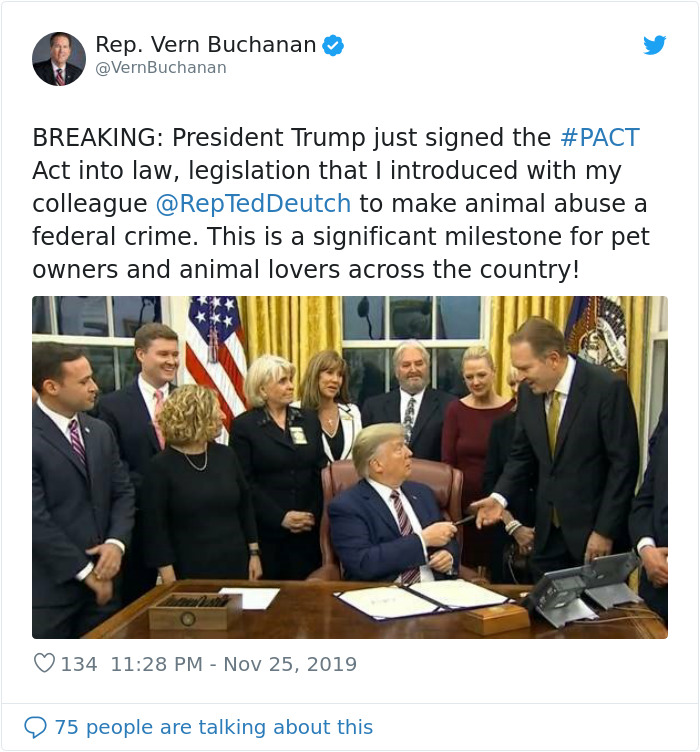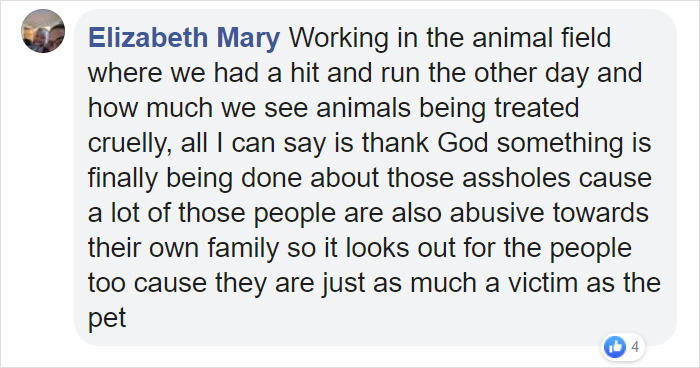With so many stories about animal cruelty surfacing ever so often, it’s only natural people would want laws to be adjusted accordingly to make that no longer acceptable in any case. Despite the fact that it may sound a little bit like utopia, the effort to make laws reflect people’s values has been made as the Preventing Animal Cruelty and Torture PACT (Act) was signed, finally making it illegal to engage in cruel acts towards animals.
The Preventing Animal Cruelty and Torture (or PACT) Act was signed on November 25
Image credits: VernBuchanan
The PACT Act was signed on Monday, November 25 by President Trump and marked a symbolic victory in the battle for animal rights. “I am pleased to sign the Preventing Animal Cruelty and Torture Act into law,” Trump said putting his signature on the bill. “It is important that we combat these heinous and sadistic acts of cruelty, which are totally unacceptable in a civilized society.”
Making it illegal to engage in cruel acts towards animals
Image credits: RepTedDeutch
According to the official Congress website, “The PACT Act makes “animal crushing” a nationwide felony in the U.S. Animal crushing is defined as when any “living non-human mammals, birds, reptiles, or amphibians is purposely crushed, burned, drowned, suffocated, impaled, or otherwise subjected to serious bodily injury.”
Cruelty against animals can now be punished by up to seven years in prison
Image credits: HumaneSociety
Sadly, that still leaves a lot of animals in the U.S. unprotected by law, since the bill excludes treatment of livestock in the animal agriculture industry; slaughtering animals for food; procedures in the veterinary field or other related industries; hunting, trapping, and fishing; predator and pest control; scientific or medical research; euthanasia; and self-defense. While some might see it as reasonable, some people are really unhappy and oppose these exceptions.
The PACT act was first introduced earlier this year and is an extension of a law that President Obama first passed in 2010
Image credits: johnfsessa
Even though this act was introduced earlier this year, it’s an extension of a law passed by President Obama in 2010. It recently passed in the House and the Senate and after few weeks of waiting finally reached the desk of the President. It was quite expected from him to sign because the bill was supported by both Republicans and Democrats in the House and the Senate.
Most people seemed excited but there were some that saw how it could be improved
10Kviews
Share on FacebookOne signature doesn't negate being a terrible human being. This should always be a law regardless of who's in office.
Agreed. I love this law, but there should also (always) be a law against separating migrant children from their parents and putting them in cages.
Load More Replies...Let's not get too excited. Trump has also rolled back protections of endangered species, among many other horrible things he's done to this planet. https://thehill.com/policy/energy-environment/457086-trump-administration-rolls-back-endangered-species-protections
It was a crime when his EPA removed a plug on the Gold King Mine in 2015 and sent 3 million gallons of toxic mine waste down the Animas River. Why it got almost zero news coverage is beyond me. All life was destroyed.
Load More Replies...One signature doesn't negate being a terrible human being. This should always be a law regardless of who's in office.
Agreed. I love this law, but there should also (always) be a law against separating migrant children from their parents and putting them in cages.
Load More Replies...Let's not get too excited. Trump has also rolled back protections of endangered species, among many other horrible things he's done to this planet. https://thehill.com/policy/energy-environment/457086-trump-administration-rolls-back-endangered-species-protections
It was a crime when his EPA removed a plug on the Gold King Mine in 2015 and sent 3 million gallons of toxic mine waste down the Animas River. Why it got almost zero news coverage is beyond me. All life was destroyed.
Load More Replies...






















248
112